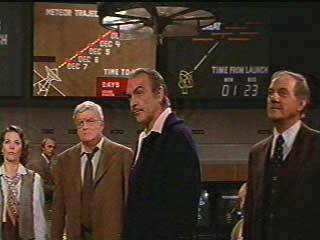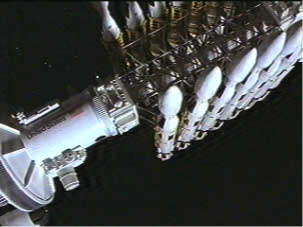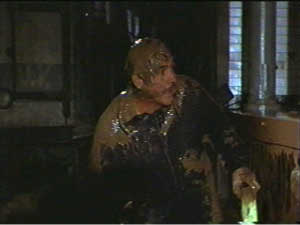Meteor
 
1979's Meteor, like all other American films about this subject, features an ancient craggy object that is woefully out of place. In this movie, that role goes to Sean Connery. Connery, clearly slumming, plays scientist Dr. Paul Bradley, who designed a space based nuclear weapon system called Hercules that was supposed to guard against the making of movies like Deep Impact. But wouldn't you know it, some people in the government thought, "Hey, we have missiles in space! Let's aim them at Russia!" Those wacky government types. Bradley, disgusted by this development, left NASA. Wouldn't you know it, a meteor is actually headed for Earth. This fact is discovered by a U.S. spacecraft that nips over to the asteroid belt from Mars orbit to observe a comet that will collide with a large asteroid. The collision destroys the spacecraft and sends a huge meteor towards Earth. The whole sequence is made rather amusing by the fact that the high tech spacecraft orbiting Mars is patterned on Skylab, the short lived U.S. space station. Meteor must have been made before Skylab piled into wallaby land.
A large part of the film deals with the political machinations that surround the very public use of the very secret Hercules weapon system to destroy the meteor. See, if the President of the United States (played by, yes, Henry "Tentacles" Fonda) admits that the platform is up there, he's afraid that the US government will look like "hypocrites and warmongers." Of course, technically, that's exactly what the US government is, but he doesn't want to admit it. Eventually the President comes up with a morally impressive course: He will lie. He simply says the platform was secret, but it was never aimed at Russia. And it turns out that the Soviets also have space based weapon system, but they won't admit to it. Soon a Soviet scientist and his translator Tatiana Nikolaevna Donskaya (Natalie Wood, believe it or not) are jetted to the U.S.
Eventually Connery uses his Scots charm to convince the Russians to combine their own satellite-mounted nukes with our own, thus gaining the necessary power to knock the meteor out of the sky. After that, there's just enough time for Bradley to hit on Woods' character, for a smaller meteor to knock the crap out of New York, and for some really boring missile footage in space. Sure, Connery adds to his silly scene count by wading through a sea of mud, but that's about as entertaining as this movie gets. The nicest thing we can say about Meteor is that, even without the computer generated special effects, it is at least as compelling an asteroid flick as Deep Impact. It's 1970's camp value gave us a lot more to talk about, especially in the realm of technology: witness a certain scene in which Bradley tears a sheet of paper from a computer printer and begins reading it upside-down. We do have to wonder, though: if the world really were about to go kablooie in a week, would the Russians waste half of that time trying to hide the fact that their orbital missiles really do exist? Quick, somebody freeze Sean Connery -- when the big one comes around, we may need his charms again.
 Review date: 5/12/99 
This review is © copyright 1999 Chris Holland & Scott Hamilton. Blah blah blah. Please don't claim that it's yours blah blah, but feel free to e-mail it to friends, or better yet, send them the URL. To reproduce this review in another form, please contact us at guys@stomptokyo.com. Blah blah blah blah.
|



